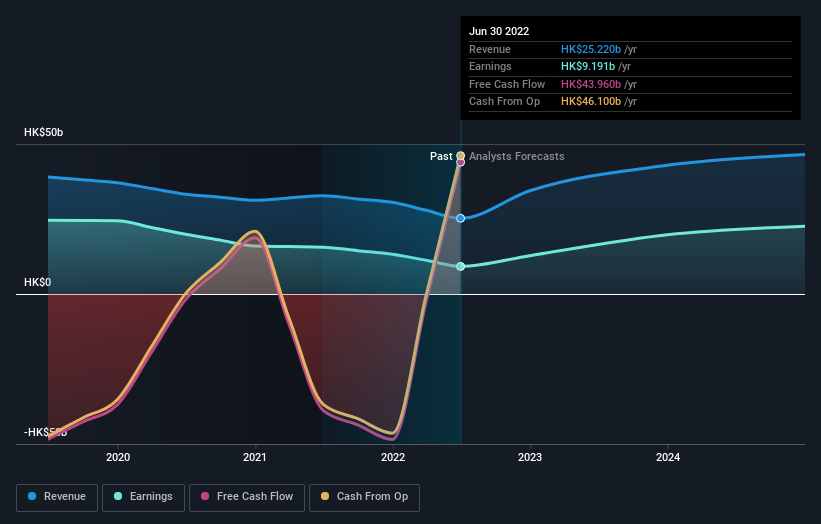Hang Seng Bank Limited's (HKG:11) top owners are public companies with 62% stake, while 31% is held by individual investors

A look at the shareholders of Hang Seng Bank Limited (HKG:11) can tell us which group is most powerful. The group holding the most number of shares in the company, around 62% to be precise, is public companies. Put another way, the group faces the maximum upside potential (or downside risk).
Individual investors, on the other hand, account for 31% of the company's stockholders.
In the chart below, we zoom in on the different ownership groups of Hang Seng Bank.
Our analysis indicates that 11 is potentially undervalued!

What Does The Institutional Ownership Tell Us About Hang Seng Bank?
Institutional investors commonly compare their own returns to the returns of a commonly followed index. So they generally do consider buying larger companies that are included in the relevant benchmark index.
Hang Seng Bank already has institutions on the share registry. Indeed, they own a respectable stake in the company. This suggests some credibility amongst professional investors. But we can't rely on that fact alone since institutions make bad investments sometimes, just like everyone does. If multiple institutions change their view on a stock at the same time, you could see the share price drop fast. It's therefore worth looking at Hang Seng Bank's earnings history below. Of course, the future is what really matters.

Hedge funds don't have many shares in Hang Seng Bank. HSBC Holdings plc is currently the company's largest shareholder with 62% of shares outstanding. This essentially means that they have extensive influence, if not outright control, over the future of the corporation. Meanwhile, the second and third largest shareholders, hold 1.4% and 1.4%, of the shares outstanding, respectively.
While it makes sense to study institutional ownership data for a company, it also makes sense to study analyst sentiments to know which way the wind is blowing. There are a reasonable number of analysts covering the stock, so it might be useful to find out their aggregate view on the future.
Insider Ownership Of Hang Seng Bank
The definition of an insider can differ slightly between different countries, but members of the board of directors always count. The company management answer to the board and the latter should represent the interests of shareholders. Notably, sometimes top-level managers are on the board themselves.
Insider ownership is positive when it signals leadership are thinking like the true owners of the company. However, high insider ownership can also give immense power to a small group within the company. This can be negative in some circumstances.
Our most recent data indicates that insiders own less than 1% of Hang Seng Bank Limited. As it is a large company, we'd only expect insiders to own a small percentage of it. But it's worth noting that they own HK$429k worth of shares. In this sort of situation, it can be more interesting to see if those insiders have been buying or selling.
General Public Ownership
The general public, who are usually individual investors, hold a 31% stake in Hang Seng Bank. While this group can't necessarily call the shots, it can certainly have a real influence on how the company is run.
Public Company Ownership
It appears to us that public companies own 62% of Hang Seng Bank. We can't be certain but it is quite possible this is a strategic stake. The businesses may be similar, or work together.
Next Steps:
I find it very interesting to look at who exactly owns a company. But to truly gain insight, we need to consider other information, too. For example, we've discovered 1 warning sign for Hang Seng Bank that you should be aware of before investing here.
Ultimately the future is most important. You can access this free report on analyst forecasts for the company.
NB: Figures in this article are calculated using data from the last twelve months, which refer to the 12-month period ending on the last date of the month the financial statement is dated. This may not be consistent with full year annual report figures.
Valuation is complex, but we're here to simplify it.
Discover if Hang Seng Bank might be undervalued or overvalued with our detailed analysis, featuring fair value estimates, potential risks, dividends, insider trades, and its financial condition.
Access Free AnalysisHave feedback on this article? Concerned about the content? Get in touch with us directly. Alternatively, email editorial-team (at) simplywallst.com.
This article by Simply Wall St is general in nature. We provide commentary based on historical data and analyst forecasts only using an unbiased methodology and our articles are not intended to be financial advice. It does not constitute a recommendation to buy or sell any stock, and does not take account of your objectives, or your financial situation. We aim to bring you long-term focused analysis driven by fundamental data. Note that our analysis may not factor in the latest price-sensitive company announcements or qualitative material. Simply Wall St has no position in any stocks mentioned.
About SEHK:11
Hang Seng Bank
Provides various banking and related financial services to individual, corporate, commercial, small and medium-sized enterprises, and institutional customers in Hong Kong, the Mainland of China, and internationally.
Proven track record with adequate balance sheet and pays a dividend.

